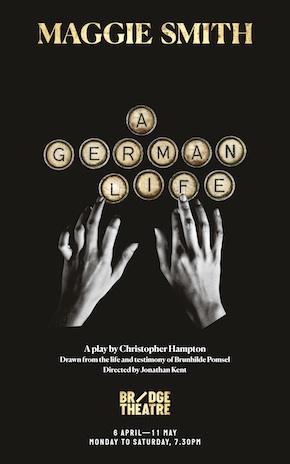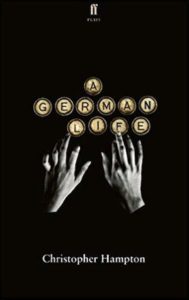A complex complicity
by Mark Reynolds “I’ve forgotten such a lot. Most of it, really. Certain things stick of course, although I’ve no idea why. I don’t understand how it works. I read something and then I go across the room to check what’s for dinner and completely forget what I’ve just read. I think, wait a minute, I’ve only just read that: I read it with my eyes wide open, I digested it – and now it’s gone. And then, all of a sudden, things from long, long ago surge up into my mind. Things I can remember in the minutest detail.
“I’ve forgotten such a lot. Most of it, really. Certain things stick of course, although I’ve no idea why. I don’t understand how it works. I read something and then I go across the room to check what’s for dinner and completely forget what I’ve just read. I think, wait a minute, I’ve only just read that: I read it with my eyes wide open, I digested it – and now it’s gone. And then, all of a sudden, things from long, long ago surge up into my mind. Things I can remember in the minutest detail.
“So you’ll have to… Anyway, let’s see how we go.”
Uneasy laughter ripples through the audience as Dame Maggie Smith performs the opening lines of A German Life, now playing a short season at London’s Bridge Theatre. We have come to be entertained, and Dame Maggie is famed for her pithy delivery, an ability to find the comical in the everyday. But is laughter a justified response here? Does the reaction perhaps hint at something more profound? We’ve come to see a play about the selective memories of Brunhilde Pomsel, a secretary to Goebbels in the Nazi regime’s Ministry of Propaganda, and expectations of an unveiling of evil are somewhat thrown by this well-groomed and articulate woman sitting comfortably in her apartment in an old people’s home, inviting us into her confidence. We expect to be appalled by Pomsel’s past actions and decisions – and her racial stereotyping is certainly rather colourful for our PC times – but the delivery is so natural and unforced, so unassumingly reflective, some part of us can’t help but drift to thoughts of how we ourselves might act if, in the wake of a catastrophic economic downturn and an influx of desperate immigrants, opportunistic, populist right-wing leaders were to emerge and turn our political expectations and beliefs on their head. Would we fight back, or go with the flow? Be outraged, or adopt a defensive gallows humour?
Drawn from the testimony Pomsel gave to Austrian filmmakers Christian Krönes, Olaf Müller, Roland Schrotthofer and Florian Weigensamer in the documentary film of the same name, and distilled from the 235-page transcript of the conversations they held with her in 2013 when she was 102, Christopher Hampton’s play strikes a delicate balance between candour and concealment, evoking empathy and horror in equal measure.
In those documents, writes Hampton in his introduction to the playscript, “suddenly she came vividly to life: her liveliness, her humour, her descriptive powers and her evasiveness, often signalled by a fracturing of her normal easy fluency.”
I’ve no idea who I actually voted for; but it was a lovely day… Yes, I suppose I must have voted Nazi, like everyone else.”
Whereas for Hampton, watching the film, “it’s scarcely possible to believe her claims that she knew nothing of the Final Solution, even though she was working in Goebbels’ office, I found myself half-convinced by the transcript, particularly her majestic indifference to what might be happening in the outside world.”
Evoking the “peace and harmony” of the quiet corner of Berlin where she was raised, she notes, “when my brothers put on their brown shirts, they’d travel out of the area.” When she came of age in time for the 1932 elections, she says, “I was very excited about finally being able to vote. I’ve no idea who I actually voted for; but it was a lovely day, a Sunday, and there were banners and music and posters all over Berlin, forget the politics, it was fantastic… Yes, I suppose I must have voted Nazi, like everyone else.”
As Hampton notes, the pauses in her fluency are always telling:
“You did read in the paper that a lot of Jews were emigrating. But you didn’t associate that with… anything terrible.”
“I suppose the truth is, we didn’t really want to know. All we knew was that the war was terrible and that the whole world was against us. And even people who had friends or family living abroad… I’ve forgotten what I was going to say.”
She declares herself “appalled” and “frightened” by Goebbels’ ‘Total War’ speech at the Berlin Sportpalast in 1945, and how the vast, baying crowd “lost their individuality. They were bewitched by this tiny man.” Urged on by the shoulder-tap of an SS Officer, she nonetheless joined in the applause.
Even in full flow, her frank reflections are frequently undercut by a mix of defiance and self-doubt:
“Nowadays, people like to think they’d have done more for the poor persecuted Jews. And I’m sure when they say that, they mean it sincerely. But they wouldn’t have. Everyone had too many problems of their own to worry about the Jews.”
“It’s so hard to think yourself back into the state of mind you were in at the time. Numb. Paralysed. I think that’s probably the best word. And a few years later, you say to yourself, did I really think those things or is it only now I think I thought them? Sorry, but it’s all quite complicated.”
“All those terrible things. We didn’t want to know about them, we really didn’t. I sat at my desk in the Propaganda Ministry and I knew as much or as little as the local greengrocer.”
“All I did was type stuff for Goebbels. I had no idea what was going on. Or very little. No more than most people. So you can’t make me feel guilty.”
At an hour and forty minutes, Maggie Smith’s monologue is an extraordinary, engrossing accomplishment, an enticing combination of acute observation and evasive vagueness. Throughout the performance, the table she sits at encroaches incrementally closer and the light behind her dims, reinforcing the penetration of moral and ethical dilemmas past and present into the audience’s heads. With all the late documentation of Pomsel’s recollections, can we yet claim to know the actual level of her complicity in the Nazi regime and the lies it propagated? Or again, whether we or our forebears might have acted differently?
“To put it simply,” concludes Hampton, “I have no idea to what extent she is telling the truth; and it was this central ambiguity that finally most attracted me to the subject. In general, I’ve always preferred to leave judgements and conclusions to the audience: the case of Brunhilde Pomsel seems to me particularly finely poised.”
 A German Life ran at the Bridge Theatre from 6 April to 11 May 2019.
A German Life ran at the Bridge Theatre from 6 April to 11 May 2019.
bridgetheatre.co.uk
The playscript by Christopher Hampton is published in paperback by Faber & Faber.
Buy from Amazon UK
Mark Reynolds is a freelance editor and writer, and a founding editor of Bookanista.
@bookanista


